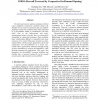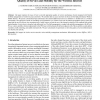66 search results - page 7 / 14 » Address Translation Mechanisms In Network Interfaces |
GROUP
2009
ACM
14 years 4 months ago
2009
ACM
Recent technological advances foster the spreading of social software in the mobile domain. Hence, future usage patterns of mobile devices will involve more group interaction. Whi...
COMCOM
2007
13 years 10 months ago
2007
We apply some of the existing web server redundancy techniques for high service availability and scalability to the relatively new IP telephony context. The paper compares various...
ISCA
1998
IEEE
14 years 1 months ago
1998
IEEE
Future parallel computers must efficiently execute not only hand-coded applications but also programs written in high-level, parallel programming languages. Today's machines ...
HPDC
2005
IEEE
14 years 4 months ago
2005
IEEE
Firewalls and network address translators (NATs) cause significant connectivity problems along with benefits such as network protection and easy address planning. Connectivity pro...
WMI
2001
13 years 11 months ago
2001
Our paper explores the issue of how to provide appropriate quality of service mechanisms closely integrated with flexible mobility management in wireless local area networks. We co...


